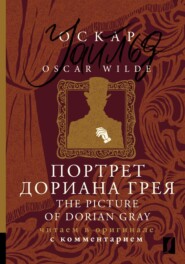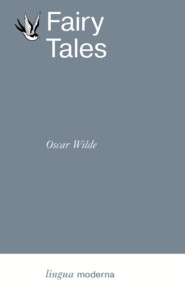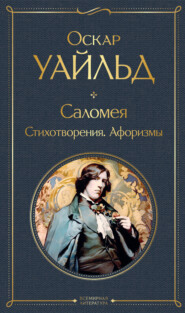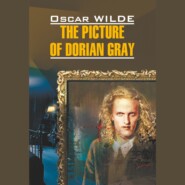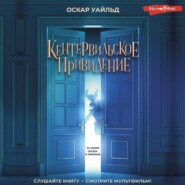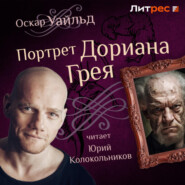По всем вопросам обращайтесь на: info@litportal.ru
(©) 2003-2024.
✖
Oscar Wilde’s Stories for All Ages
Настройки чтения
Размер шрифта
Высота строк
Поля
‘…when he had bathed himself in clear water, he opened a great painted chest, and from it he took the leathern tunic and rough sheepskin cloak that he had worn when he had watched on the hillside the shaggy goats of the goatherd. These he put on, and in his hand he took his rude shepherd’s staff.’
them not a word, but passed on, and went down the bright porphyry staircase, and out through the gates of bronze, and mounted upon his horse, and rode towards the cathedral, the little page running beside him.
And the people laughed and said, ‘It is the King’s fool who is riding by,’ and they mocked him.
And he drew rein and said, ‘Nay, but I am the King.’ And he told them his three dreams.
And a man came out of the crowd and spake bitterly to him, and said, ‘Sir, knowest thou not that out of the luxury of the rich cometh the life of the poor? By your pomp we are nurtured, and your vices give us bread. To toil for a hard master is bitter, but to have no master to toil for is more bitter still. Thinkest thou that the ravens will feed us? And what cure hast thou for these things? Wilt thou say to the buyer, “Thou shalt buy for so much,” and to the seller, “Thou shalt sell at this price?” I trow not. Therefore go back to thy Palace and put on thy purple and fine linen. What hast thou to do with us, and what we suffer?’
‘Are not the rich and the poor brothers?’ asked the young King.
‘Aye,’ answered the man, ‘and the name of the rich brother is Cain.’
And the young King’s eyes filled with tears, and he rode on through the murmurs of the people, and the little page grew afraid and left him.
And when he reached the great portal of the cathedral, the soldiers thrust their halberts out and said, ‘What dost thou seek here? None enters by this door but the King.’
And his face flushed with anger, and he said to them, ‘I am the King,’ and waved their halberts aside and passed in.
And when the old Bishop saw him coming in his goatherd’s dress, he rose up in wonder from his throne, and went to meet him, and said to him, ‘My son, is this a king’s apparel? And with what crown shall I crown thee, and what sceptre shall I place in thy hand? Surely this should be to thee a day of joy, and not a day of abasement.’
‘Shall Joy wear what Grief has fashioned?’ said the young King. And he told him his three dreams.
And when the Bishop had heard them he knit his brows, and said, ‘My son, I am an old man, and in the winter of my days, and I know that many evil things are done in the wide world. The fierce robbers come down from the mountains, and carry off the little children, and sell them to the Moors. The lions lie in wait for the caravans, and leap upon the camels. The wild boar roots up the corn in the valley, and the foxes gnaw the vines upon the hill. The pirates lay waste the sea-coast and burn the ships of the fishermen, and take their nets from them. In the salt-marshes live the lepers; they have houses of wattled reeds, and none may come nigh them. The beggars wander through the cities, and eat their food with the dogs. Canst thou make these things not to be? Wilt thou take the leper for thy bedfellow, and set the beggar at thy board? Shall the lion do thy bidding, and the wild boar obey thee? Is not He who made misery wiser than thou art? Wherefore I praise thee not for this that thou hast done, but I bid thee ride back to the Palace and make thy face glad, and put on the raiment that beseemeth a king, and with the crown of gold I will crown thee, and the sceptre of pearl will I place in thy hand. And as for thy dreams, think no more of them. The burden of this world is too great for one man to bear, and the world’s sorrow too heavy for one heart to suffer.’
‘Sayest thou that in this house?’ said the young King, and he strode past the Bishop, and climbed up the steps of the altar, and stood before the image of Christ.
He stood before the image of Christ, and on his right hand and on his left were the marvellous vessels of gold, the chalice with the yellow wine, and the vial with the holy oil. He knelt before the image of Christ, and the great candles burned brightly by the jewelled shrine, and the smoke of the incense curled in thin blue wreaths through the dome. He bowed his head in prayer, and the priests in their stiff copes crept away from the altar.
And suddenly a wild tumult came from the street outside, and in entered the nobles with drawn swords and nodding plumes, and shields of polished steel. ‘Where is this dreamer of dreams?’ they cried. ‘Where is this King, who is apparelled like a beggar—this boy who brings shame upon our state? Surely we will slay him, for he is unworthy to rule over us.’
And the young King bowed his head again, and prayed, and when he had finished his prayer he rose up, and turning round he looked at them sadly.
And lo! through the painted windows came the sunlight streaming upon him, and the sunbeams wove round him a tissued robe that was fairer than the robe that had been fashioned for his pleasure. The dead staff blossomed, and bare lilies that were whiter than pearls. The dry thorn blossomed, and bare roses that were redder than rubies. Whiter than fine pearls were the lilies, and their stems were of bright silver. Redder than male rubies were the roses, and their leaves were of beaten gold.
He stood there in the raiment of a king, and the gates of the jewelled shrine flew open, and from the crystal of the many-rayed monstrance shone a marvellous and mystical light. He stood there
‘He stood there in the raiment of a king, and the gates of the jewelled shrine flew open, and from the crystal of the many-rayed monstrance shone a marvellous and mystical light.’
in a king’s raiment, and the Glory of God filled the place, and the saints in their carven niches seemed to move. In the fair raiment of a king he stood before them, and the organ pealed out its music, and the trumpeters blew upon their trumpets, and the singing boys sang.
And the people fell upon their knees in awe, and the nobles sheathed their swords and did homage, and the Bishop’s face grew pale, and his hands trembled. ‘A greater than I hath crowned thee,’ he cried, and he knelt before him.
And the young King came down from the high altar, and passed home through the midst of the people. But no man dared look upon his face, for it was like the face of an angel.
THE SELFISH GIANT (#ulink_726e5d2b-d2ff-517c-9f91-af634d8330fe)
Introduction (#ulink_d341e8dd-690f-5b28-a03d-331359e05481)
I have a great affection for The Selfish Giant. Scenes of Oscar reading it to his sons Cyril and Vyvyan served as a kind of running thread through the narrative frame of the film Wilde, in which I had the impossible pleasure and imponderable honour of playing Oscar.
As with Wilde’s stories The Happy Prince and The Young King, we can discern a religious element in the conclusion to The Selfish Giant; in this case we are treated to the specific revelation that the sobbing boy the giant had handed up into the tree is in fact the Christ Child. Wilde’s famous lines from The Ballad of Reading Gaol—‘each man kills the thing he loves’—are recalled when the child says of his scars, his stigmata, ‘Nay…but these are the wounds of Love.’
Wilde’s obsessions often shuttled between suffering and joy, pain and pleasure, love and death, each seeming to be necessary for the other. In his letter to Lord Alfred Douglas, De Profundis, written in prison, he lays out a theory of suffering and a theory of Christ the Artist both of which repay careful reading, but it is in this sweet and lovely story that those ideas come together most naturally and easily.
Wilde himself could be thought of as a Selfish Giant, of course. He was a very large man in frame—well over six foot in height and surprisingly broad and strong for one whose reputation was that of a velvet-clad dandy whose greatest professed ambition was to be able to live up to his collection of blue and white china. He was a giant in intellect and a giant of his age in talent, fame and brilliance. Did he guiltily feel that his ‘garden’ was barren, that his neglect of his wife and children was not unlike that of the giant in his story? A religious person might note Wilde’s own deathbed conversion to Roman Catholicism and draw strong parallels between this story and Wilde’s life. Happily the story is strong enough to stand without any such knowledge or belief, but there it is for you to consider just the same.
THE SELFISH GIANT (#ulink_9e8ea697-f4ef-59bf-b8b3-50f8d868c1eb)
EVERY AFTERNOON, as they were coming from school, the children used to go and play in the Giant’s garden.
It was a large lovely garden, with soft green grass. Here and there over the grass stood beautiful flowers like stars, and there were twelve peach-trees that in the spring-time broke out into delicate blossoms of pink and pearl, and in the autumn bore rich fruit. The birds sat on the trees and sang so sweetly that the children used to stop their games in order to listen to them. ‘How happy we are here!’ they cried to each other.
One day the Giant came back. He had been to visit his friend the Cornish ogre, and had stayed with him for seven years. After the seven years were over he had said all that he had to say, for his conversation was limited, and he determined to return to his own castle. When he arrived he saw the children playing in the garden.
‘What are you doing here?’ he cried in a very gruff voice, and the children ran away.
‘It was a large lovely garden, with soft green grass. Here and there over the grass stood beautiful flowers like stars, and there were twelve peach-trees that in the spring-time broke out into delicate blossoms of pink and pearl, and in the autumn bore rich fruit.’
‘My own garden is my own garden,’ said the Giant; ‘any one can understand that, and I will allow nobody to play in it but myself.’ So he built a high wall all round it, and put up a notice-board.
TRESPASSERS
WILL BE
PROSECUTED
He was a very selfish Giant.
The poor children had now nowhere to play. They tried to play on the road, but the road was very dusty and full of hard stones, and they did not like it. They used to wander round the high wall when their lessons were over, and talk about the beautiful garden inside. ‘How happy we were there,’ they said to each other.
Then the Spring came, and all over the country there were little blossoms and little birds. Only in the garden of the Selfish Giant it was still winter. The birds did not care to sing in it as there were no children, and the trees forgot to blossom. Once a beautiful flower put its head out from the grass, but when it saw the notice-board it was so sorry for the children that it slipped back into the ground again, and went off to sleep. The only people who were pleased were the Snow and the Frost. ‘Spring has forgotten this garden,’ they cried, ‘so we will live here all the year round.’ The Snow covered up the grass with her great white cloak, and the Frost painted all the trees silver. Then they invited the North Wind to stay with them, and he came. He was wrapped in furs, and he roared all day about the garden, and blew the chimney-pots down. ‘This is a delightful spot,’ he said, ‘we must ask the Hail on a visit.’ So the Hail came. Every day for three hours he rattled on the roof of the castle till he broke most of the slates, and then he ran round and round the garden as fast as he could go. He was dressed in grey, and his breath was like ice.
‘I cannot understand why the Spring is so late in coming,’ said the Selfish Giant, as he sat at the window and looked out at his cold white garden; ‘I hope there will be a change in the weather.’
But the Spring never came, nor the Summer. The Autumn gave golden fruit to every garden, but to the Giant’s garden she gave none. ‘He is too selfish,’ she said. So it was always Winter there, and the North Wind, and the Hail, and the Frost, and the Snow danced about through the trees.
One morning the Giant was lying awake in bed when he heard some lovely music. It sounded so sweet to his ears that he thought it must be the King’s musicians passing by. It was really only a little linnet singing outside his window, but it was so long since he had heard a bird sing in his garden that it seemed to him to be the most beautiful music in the world. Then the Hail stopped dancing over his head, and the North Wind ceased roaring, and a delicious perfume came to him through the open casement. ‘I believe the Spring has come at last,’ said the Giant; and he jumped out of bed and looked out.
What did he see?
He saw a most wonderful sight. Through a little hole in the wall the children had crept in, and they were sitting in the branches of the trees. In every tree that he could see there was a little child. And the trees were so glad to have the children back again that they had covered themselves with blossoms, and were waving their arms gently above the children’s heads. The birds were flying about and twittering with delight, and the flowers were looking up through the green grass and laughing. It was a lovely scene, only in one corner it was still winter. It was the farthest corner of the garden, and in it was standing a little boy. He was so small that he could not reach up to the branches of the tree, and he was wandering all round it, crying bitterly. The poor tree was still quite covered with frost and snow, and the North Wind was blowing and roaring above it. ‘Climb up! little boy,’ said the Tree, and it bent its branches down as low as it could; but the boy was too tiny.
And the Giant’s heart melted as he looked out. ‘How selfish I have been!’ he said; ‘now I know why the Spring would not come here. I will put that poor little boy on the top of the tree, and then I will knock down the wall, and my garden shall be the children’s playground for ever and ever.’ He was really very sorry for what he had done.
So he crept downstairs and opened the front door quite softly, and went out into the garden. But when the children saw him they were so frightened that they all ran away, and the garden became winter again. Only the little boy did not run, for his eyes were so full of tears that he did not see the Giant coming. And the Giant stole up behind him and took him gently in his hand, and put him up into the tree. And the tree broke at once into blossom, and the birds came and sang on it, and the little boy stretched out his two arms and flung them round the Giant’s neck, and kissed him. And the other children, when they saw that the Giant was not wicked any longer, came running back, and with them came the Spring. ‘It is your garden now, little children,’ said the Giant, and he took a great axe and knocked down the wall. And when the people were going to market at twelve o’clock they found the Giant playing with the children in the most beautiful garden they had ever seen.
All day long they played, and in the evening they came to the Giant to bid him good-bye.







